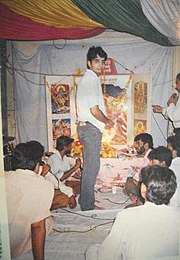Jagran
Thank you for being part of the Bharatpedia family! 0% transparency: ₹0 raised out of ₹100,000 (0 supporter) |

A jagran in honour of Devi, the Hindu goddess.
Jāgran (जागरण) or jāgrata or jaag is a Hindu ritual, mainly prevalent in North India, consisting of all-night vigil, songs and dance in honour of a deity and puja. Often, jagran is performed in honour of various Hindu goddesses (Devi), Shiva as well as various folk deities like Khandoba[1] and Devnarayan.[2] Devotees worship the deity throughout night by singing bhajans, reciting aarti and listening to legends of the deity.[3]
References[edit]
- ↑ Richard Keith Barz; Monika Thiel-Horstmann (1989). Living Texts from India. Otto Harrassowitz Verlag. pp. 46–. ISBN 978-3-447-02967-4.
- ↑ Peter J. Claus; Sarah Diamond; Margaret Ann Mills (2003). South Asian Folklore: An Encyclopedia : Afghanistan, Bangladesh, India, Nepal, Pakistan, Sri Lanka. Taylor & Francis. pp. 146–. ISBN 978-0-415-93919-5.
- ↑ Scott, Jamie S. (15 March 2012). The Religions of Canadians. University of Toronto Press. ISBN 978-1-4426-0518-3.
